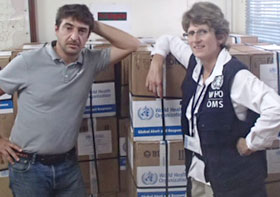Building capacity for laboratory services

WHO
Well-functioning laboratory services are an essential component of health systems, for public health surveillance, disease control and clinical diagnosis.
WHO works with countries to improve the quality of their laboratory services, by developing national policies and strategies, establishing laboratory quality management systems and supporting implementation of core capacities agreed under the International Health Regulations (2005).
Laboratories are often in the front line of the response to outbreaks. In recent months, staff from WHO/Europe have contributed to the global response to Ebola virus disease (EVD), including working in West Africa to improve laboratory services.
Laboratory coordinator in Sierra Leone
Dr Caroline Brown, Programme Manager for Influenza and other Respiratory Pathogens and leader of the "Better Labs for Better Health" initiative at WHO/Europe, worked in Sierra Leone from October to November 2014 as laboratory coordinator for WHO. At that time, Sierra Leone was experiencing a rapid increase in the number of cases of EVD.
Her work there involved collaboration with the National Laboratory Working Group to ensure speedy, accurate laboratory confirmation of EVD cases and testing suspected cases so that infected people could be transferred to EVD treatment centres and people who did not have the virus could be discharged.
"I cannot praise the work of the lab technicians in Sierra Leone more highly. During my time in the country they worked day in and day out, collecting samples in extremely difficult, physically demanding and dangerous conditions, performing an absolutely essential task," said Caroline Brown.
When on assignment, Dr Brown's specific tasks included:
- training lab technicians to collect samples from patients under extremely difficult conditions (wearing full personal protective equipment in extreme heat);
- conducting emergency procurement of essential laboratory supplies, including swabs and blood collection tubes;
- facilitating the reporting of laboratory results to clinicians and to EVD command centres;
- providing advice on the placement of new mobile laboratories; and
- liaising with partners and donors and reporting on the laboratory situation to WHO's response team.
The provision of fast, accurate laboratory results in both emergency and ordinary circumstances requires that all the components of the system—human resources, supplies and the supply chain, the information system linking patients and results, sample collection, packaging and transport under cold chain conditions, accurate analysis and clear reporting mechanisms—work effectively together.
New website: Laboratory services
The new laboratory services site explains how WHO/Europe helps improve the quality of laboratory services, coordinates laboratory networks (labnets) and works with WHO collaborating centres to support the surveillance and control of targeted diseases, including polio, measles and rubella, influenza, and multi-drug-resistant tuberculosis.
The Regional Office coordinates activities related to emerging viral pathogens through the global Especially Dangerous Pathogens Laboratory Network (EDPLN). It also provides tools and training courses for biosafety and biosecurity and for assessing the quality of national laboratory systems and individual laboratories.



